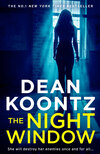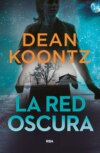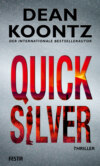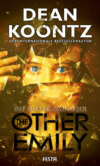Kitabı oku: «The Night Window», sayfa 6
4
With its thousands of blacktop rivers and millions of metal currents, the Los Angeles evening rush lasted not one hour, but three or four. The Valley streets overflowed with vehicles surging-slackening-surging to and from the dysfunctional freeways. Vikram gave Jane an address, but the flood of traffic didn’t frustrate her. There were many questions to be answered, explanations to be made, and an understanding to be arrived at before they reached their destination.
She said, “You could have confronted me in the library.”
Vikram shook his head. “Not safely, I think. When you see me suddenly show up, you don’t see a lean but sinewy dark-eyed black-haired young man who might have been a Bollywood star. Instead you see FBI, and you think you’re trapped. So logically, an unfortunate confrontation ensues.”
“‘Lean but sinewy’?”
Vikram shrugged. “When describing myself to various online matchmaking services, the word ‘slim’ can be interpreted as meaning skinny or worse. Anyway, say I show up in the library and say just maybe you don’t shoot me, there’s still bound to be a scene that people are witness to. They call the police, they post it on YouTube, and we are toast.”
“Your relatives herded me into that vacant photography studio. Why weren’t you waiting for me in that place, where there weren’t any witnesses?”
Vikram raised his right hand, pointing at the roof of the SUV with his forefinger, as if to say, One important point to consider. “Remember, the chase had only just begun, and you were virtually sweating adrenaline.”
“I don’t sweat virtually.”
“Nevertheless, the math said the risk of my being shot on sight was still too high at that time.”
“‘Math’?”
“I have my formulas. It was wiser to lead you through a few twists and turns, give you time to understand this wasn’t a standard law-enforcement operation. Then I show up alone, no backup, and you realize I am harmless.”
“Who is Garret Nolan?”
“Mr. Motorcycle? He’s not one of us. He was just a hiccup. There are always hiccups. Some say that life is one long series of hiccups, although personally I’m not so pessimistic. Farther along that street from Mr. Nolan, a Honda waited at the curb, its engine running. A bright red Honda. Studies show that, in a crisis, the eye is drawn to red things. My brother, wearing a flamboyant red shirt, was prepared to leap out of the red Honda and dash into a Chinese restaurant, ostensibly to pick up an order of takeout, but in fact giving you a chance to steal his wheels, which of course we could track by its GPS. However, you found Mr. Nolan first. Beware, the traffic light is about to turn red.”
Jane braked to a stop. She looked at her passenger.
Smiling into her silence, Vikram said, “What?”
“You scripted it like some chase scene in a movie?”
“When I build a back door into the computer system of a major telecom provider, I don’t just wing it, you know. To get away with it, I have to be meticulous. Being meticulous is what makes me Vikram Rangnekar.”
“If Garret Nolan was a hiccup, unexpected, how did you track me from the time he gave me a ride?”
“Just in case, my cousin Ganesh tagged you earlier in the library.”
She recalled the plump guy in khakis and a yellow pullover, at a workstation near her in the computer alcove. “‘Tagged’?”
“As you were leaving, Ganesh fired a little device loaded with an adhesive microminiature transponder. Hit you in the back.”
When she had glanced at Ganesh, he’d been holding something in his left hand, down at his side. “I didn’t feel it happen.”
“You wouldn’t,” Vikram said. “It’s low-velocity. The soft projectile weighs three-quarters of an ounce. It partially unravels and weaves itself into the fabric of your coat. Lithium battery the size of a pea. It’s trackable by satellite, just like any vehicle with a GPS.”
She said, “Jhav.”
Vikram’s eyebrows arched. “That is a Hindi word.”
“But appropriate.”
“Wherever did you learn that word?”
“From you.”
“Not possible. I would never use that word in the presence of a woman.”
“You use it all the time when you’re at a computer, backdooring your way into one place or another.”
“Is that really true? I was unaware. I hope you don’t know what it means.”
“It means ‘fuck.’”
“I am mortified.”
“It’s me who should be mortified, being tagged and not even aware of it. Jhav!”
A horn blared behind them. The light had changed.
Vikram again pointed at the roof with one finger. “The light has changed.”
“No shit?” she said as she took her foot off the brake.
“I sense you’re perturbed at me.”
“No shit?”
“Why are you perturbed at me?”
“You played me. I don’t like being played.”
“The math said it was necessary.”
“Math isn’t everything. Trust is important.”
“I trust the math.”
“I remembered you as a sweet man. I forgot the annoying part.”
Vikram grinned. “Is that really true?”
“Yes. You can be über-annoying.”
“I meant the ‘sweet man’ part.”
Rather than encourage him, she said, “So you knew what motel I was staying in.”
“Yes. But I expected you to return there in the red Honda, not on the motorcycle. Nevertheless, it worked out.”
“How the jhav did you find me in the first place?”
“Just so you know, I am not one who is turned on by women talking dirty.”
“Don’t make me have to shoot you, Vikram. How did you find me?”
“Now that,” he said, “is quite a story.”
5
Charlie Weatherwax leaves the blind man in the park, crosses the boulevard, and walks through the public spaces around city hall, into a residential neighborhood of tree-lined streets, and from there into the fabled shopping district of Beverly Hills, north of Wilshire. The sidewalks are crowded with moneyed locals bearing shopping bags, also with gaping tourists dazzled by the gleaming shops as well as by the countless Mercedes, Bentleys, and Rolls-Royces. They see one another and interact, but they do not know one another, these islanders of the human archipelago, and they would have it no other way, though if asked they would lay claim to all manner of communal values.
As the sky gradually darkles and the lighted windows of the closing shops radiate glamour and romance into the evening streets, he makes his way to a fine restaurant at which he has a reservation. A choice table awaits him in a corner of the elegant Art Deco bar, the design of which seems to have been inspired by the clean, highly stylized features of his face.
He is not halfway through his martini when he receives an encrypted call on his smartphone. In spite of all its vast resources in both the public and private sectors, the Arcadian revolution has taken two weeks to get a lead on Vikram Rangnekar, but at last they are ready to provide Charlie with an address. His team will be awaiting him at the Peninsula in an hour.
He must be satisfied with a less leisurely dinner than he anticipated, and a single martini instead of two. But the evening will be a lively one, with hard truths taught to the revolution’s enemies.
6
Riding shotgun without benefit of a shotgun, Vikram Rangnekar thought, I have never been happier. Which was amazing, considering that he had been happy for all his thirty years. According to his mother, Kanta, he had never once been cranky as a baby, and indeed had greeted the obstetrician and delivery-room nurses not with a cry of distress at being expelled from the womb, but with a sound that seemed to be part sigh, part giggle, and with a smile. His father, Aadil, called him chotti batasha, which meant “little sugar candy,” because he was always so good-natured and cheerful. There were those who resented being exposed to his unrelenting sunniness, and a few who even despised him for it; he repaid their hostility with neither anger nor pity, but with indifference, for he was not inclined to let other people annoy him.
Of course bad things had happened to Vikram. No one got a free ride in this troubled world. There were times when he was sad, but those spells were transient and almost always related to the death of someone he loved or admired. For as long as he could remember, he’d understood that happiness was a choice, that there were people who didn’t realize it was theirs to choose or who, for whatever reason, preferred to be perpetually discontented, even angry, even despairing. Most of that type were very political, which Vikram was not. Or they were consumed by envy, which Vikram was not. Or they loved themselves too much, so that they never felt the world was treating them well enough, or they liked themselves too little and wished they were someone else. Vikram liked who he was, although he didn’t think he was God’s gift either to the world or to women.
He’d had his share of romance. He wasn’t a virgin at thirty. There were some women who liked lean and sinewy guys who were gentle and treated them with respect. Of his few paramours, however, none had been fated to be with him forever. One turned out to be waiting to meet a slab of muscle named Curt, who would abuse and disrespect her, and she went off with him. Another, in her second year of graduate school, having learned that men were unnecessary social constructs, vowed to have relations henceforth only with a battery-powered device. The third, an idealistic girl named Larisa, pursuing a career in broadcast journalism, to her dismay concluded that her chosen profession was largely populated by “narcissistic, ill-educated phonies,” and left Washington, where Vikram lived in those days, to return to her hometown—Cedar Rapids, Iowa—where she hoped “to find something real.”
Fortunately, Vikram’s happiness did not depend on the condition of his romantic life.
He thought again, I have never been happier, and of course his current extreme good cheer had everything to do with his driver, Jane Hawk, with whom he’d been infatuated for more than five years. His was largely a platonic infatuation, though not entirely. He was a man, after all, and Jane was too beautiful and too desirable for any straight man to yearn to be only her friend. However, he knew there would never be any romance between them. The sadness of that realization was but a droplet compared to the great warm welling of happiness that he felt just being in her company. When Nick had been alive, no man on Earth could have stolen Jane’s heart, for she had loved him—and he’d loved her—with an intensity that nineteenth-century novelists had described convincingly, but that was seldom found in contemporary arts because such love alluded to a higher love that inspired only contempt in the artists of this era—well, contempt and fear. In death, Nick haunted his lovely widow, not by his spirit’s choice but by her insistent invitation; even if Jane thoroughly avenged her husband’s murder, Vikram suspected that Nick might always be in the doorway of her heart, barring entrance to all other men.
Unrequited love was reward enough for him, which had better be the case, considering that, by coming to this woman’s aid, he put his life at risk and might not survive long enough to earn even a kiss on the cheek.
“How did you find me?” she repeated as she piloted the Explorer Sport through a Pamplona of wheeled bulls all charging southward on Interstate 405 into a sudden inexplicable absence of congestion, the light of the setting sun flickering off brightwork and window glass.
“It’s known that you’ve been driving off-market vehicles with forged plates,” Vikram said. “You had to abandon a black Ford Escape in Texas when the highway patrol pulled you over for some reason, not realizing who you were. You left the trooper handcuffed to your Ford and split in his cruiser. The FBI took your car apart, trying to track its history, but they got epsilon out of it, nothing, nada. I remembered something you told me after you closed the Marcus Paul Headsman case, about this cash-only car dealer in Nogales, Arizona.”
Marcus Paul Headsman had been a serial killer who tried to live up to his surname by collecting the heads of his victims and storing them in a freezer. He said he would have liked to keep their bodies as well, but he would have had to buy several new freezers, for which he lacked the funds.
Headsman had stolen a vehicle from Enrique de Soto, who ran a black-market operation out of a series of barns on a property outside of Nogales. Enrique paid boosters for hijacked cars and trucks. He ferried the hot merchandise directly across the border to Nogales, Mexico, where his people stripped out the GPS and all identifiers. They rebuilt the engine of each vehicle to ensure it would be faster than anything a cop would be driving and returned it to Arizona. Enrique provided forged registration papers and license plates for every customer, which in spite of being bogus had been inserted in Department of Motor Vehicles digital records and would allay the suspicions of any officer of the law. When Headsman was caught, he gave up Enrique, hoping to buy a little leniency.
“I remembered,” said Vikram. “I remember so much of what you told me over the years. Probably all of it. So I backdoored Bureau case files to see what had happened to Enrique de Soto.”
“Nothing happened to him,” Jane said. “We were after Marcus Paul Headsman, and we got him. No time for small fish like Enrique.”
Even when the Bureau was well managed, when it wasn’t being weaponized and used against domestic political enemies, it was nonetheless overwhelmed with cases and needed to practice triage, focusing its manpower on the most egregious crimes that were urgently in need of being addressed. When lesser scofflaws were found wriggling under the rocks that had been overturned in the pursuit of more dangerous and consequential felons, they were either referred to local authorities or added to a collateral-crimes file for later investigation, which is what happened to Enrique de Soto’s case. Later investigation usually translated as the day after never, because there was always bigger game to hunt.
Vikram said, “I remember you wanted to go after de Soto, but if you pushed the issue, your superiors would see you as a quarterback for lost causes. You had to conform to the Bureau Way if you were to have a future in it.”
“And look how well that turned out.”
“So I figured maybe you were getting vehicles from de Soto. I deleted him from the collateral-crimes file, so that no one else in the Bureau would make a connection between him and the Headsman case, and I went down to Nogales to talk with him.”
They were coming toward an exit to a place they didn’t want to go. Jane changed lanes, took the ramp, descended the banked curve at what felt like two Gs, and shot into a neighborhood of industrial buildings that loomed in dark and threatening configurations against the crimson western sky.
She pulled to the curb, put the Explorer in park, switched off the headlights, and turned to Vikram. “Are you freakin’ crazy?”
“What? What’d I do?”
“Ricky de Soto isn’t just some half-assed chop-shop dirtbag. He deals weapons, he’s in human trafficking, he’s a stone-cold killer when he has to be.”
“Well, you deal with him.”
“I don’t have any choice but to deal with him, I know how to deal with him, I can hand him his balls on a plate if I have to, but I still watch my back every damn second I’m near him. But you! You weren’t trained at Quantico. If you carried a gun you’d be no danger to anyone but yourself. When you walk into Ricky’s operation, you’re a bunny rabbit stepping into a wolf’s den.”
“I’m no bunny rabbit,” Vikram protested.
She punched his arm.
“Ow!”
“You’re a sweet, naïve damn bunny rabbit,” she insisted, and she punched him again to emphasize her assertion.
7
On the freeway high above, headlights drilled the descendent night as traffic rocketed toward Long Beach and points south. Of the surrounding factories and warehouses and storage yards, some were eerily lighted and engaged in seemingly infernal industry, others perhaps abandoned, dark walls bearing spray-painted Day-Glo gang symbols like the runes of an off-planet civilization. The streets were vaguely lighted by lampposts, some having been shot out for sport. As the last sunlight bled from the sky, the only vehicles on the move nearby were large trucks that resembled military transports embarked on a clandestine mission in a world at perpetual war.
Jane’s heart pounded as though she’d just boarded the Explorer after a hundred-yard dash. She had lost people who were dear to her, who were dead because they tried to help her, and their deaths weighed on her more painfully every day. Others were even now at risk, not least of all the people who had taken her son, Travis, into their home in Scottsdale, to hide him there for the duration. She could kill any bloody-minded Arcadian who came at her with murderous intent and suffer no enduring anguish, but the guiltless who died because of her were a stain on her soul. She hoped, perhaps irrationally, that she’d be able to conclude this crusade without inducing other innocents to join the resistance only then to forfeit their lives.
And now here was Vikram.
“What’d you hit me for?”
“I don’t want you dead.”
“Don’t worry about me. I’ve got winnitude.”
“‘Winnitude’?”
“Winnitude. I land on my feet like a cat.”
“Like a kitten. Ricky de Soto is a viper. You’re not in his league.”
“Obviously he didn’t kill me.”
“Which is astounding. You just walk in on him, wanting to know did he sell me some off-market wheels—me, the most-wanted fugitive in the country.”
“I knew it was tricky—”
“‘Tricky’?”
“So I didn’t go alone.”
She closed her eyes. “Whatever you’re about to say isn’t going to make it better.”
“There were five of us. My brother. An uncle. Two cousins, including Judy, the one who was driving the Escalade at the library earlier. There’s safety in numbers.”
“There’s no safety in numbers,” Jane disagreed.
“What’s he going to do—kill us all?”
“Yes. Exactly. He’d likely kill you all, have his guys dig a mass grave with a backhoe, dump you in it, cover you up, and go out for a nice lunch.”
“First thing, I explained about the Bureau’s collateral-crimes file, how I’d done him the big favor of deleting him from it.”
“I want to hit you again. Damn it, Vikram, at that moment he realized only you know about him and only you could one day insert him in the file again or tell the FBI about him.”
Massaging his arm where she’d hit him, Vikram thought about what he’d done. After a silence, he said, “I guess it could have gotten ugly at that point.”
“Ugly. Oh, you don’t know ugly.”
“But it didn’t.” He grinned and said, “You know why it didn’t get ugly? Because Enrique is hot for you.”
“That’s not exactly news to me, Vikram. If I didn’t have the widow-in-mourning excuse, I’d have had to pull a gun on Ricky more than once.”
“I explained to him how I could help you if I could find you, how I could almost surely find you if I knew what you were driving. I gave him a demonstration on his computer, how I can backdoor everyone from the FBI to the National Security Agency to Homeland Security. He was mega impressed. He offered me a position with his company.”
“It’s not a company, Vikram. It’s a criminal operation.”
“Anyway, he was excited to think you might survive all this and then you’d owe him and maybe think of him as Sir Gilligan.”
“Who?”
“I realized he meant Galahad, from the knights of the Round Table, but I didn’t think it would be smart to correct him.”
“That’s why you still have a tongue.”
“Anyway,” Vikram said, pointing at the roof again with his right index finger, “the important thing is he believed me. He told me what he’d last sold you and what license plates he put on it.”
Nationwide, most police cruisers and many government vehicles were equipped with 360-degree license-plate-scanning systems that automatically recorded the numbers from all the vehicles around them. They continuously transmitted the data to regional archives but also to the National Security Agency’s million-square-foot data center in Utah.
Three years ago, at the instruction of corrupt officials high in the Department of Justice, Vikram had installed a rootkit in the NSA’s system. This powerful malware program functioned at such a low level that he could swim through their data troves without risk of drawing the attention of IT security sharks.
Although he had delighted in demonstrating his genius—his wicked little babies—to Jane, although he had taught her how to backdoor telecom companies, the Department of Motor Vehicles in any of the fifty states, and numerous other entities, he had carefully avoided exposing her to charges of espionage. He had never shown her how to access the NSA or any other intelligence service.
So after making a new best friend in Enrique de Soto, he had backdoored the NSA to search the archives of license-plate scans for the number that Ricky had provided when he’d sold the Ford Explorer Sport to Jane.
“In the less than two weeks you’ve had the vehicle,” Vikram said, “the plates have been scanned on twelve occasions. Twice in Arizona. Otherwise in various places in Southern California. The most recent was Wednesday, in the San Fernando Valley, on Roscoe Boulevard, by a scanner-equipped car belonging to the Environmental Protection Agency.”
The NSA also retained vast video files from key public-building security cameras and from tens of thousands of traffic cams in major metropolitan areas. Using the date and time—12:09 P.M.—of the EPA automatic recording of the Explorer license plate, Vikram accessed those video archives to review the intersections of Roscoe Boulevard and other streets in the vicinity of the sighting.
“It was Wednesday evening when I was tooling this, using my laptop in a hipster hotel in Santa Monica. I found your Explorer on video in ten minutes and followed it nine blocks to the Counting Sheep, where it seemed you’d taken a room early that afternoon. So then I got in my car and drove there for real, and sure enough your SUV was parked right in front of Room Three. Before you hit me again, consider that if it was the black hats who had that license number, you’d already be in their custody or dead.”
Jane grimaced. “I’m not going to hit you again.”
“But I’ll understand if you do. Totally. Unequivocally. I now understand your point of view. Enrique. Viper. Out of my league.”
“If you were at the motel two nights ago, why didn’t you contact me then?”
“The math was still way bad. High probability that you would’ve shot me on sight, at least to wound.”
“What—your formulas are based on the assumption I’m trigger-happy?”
“No, no, no. But math is math. I went back to my hotel and cooked up my little scenario in about an hour and got my cast together, and it worked out great.”
Although he was thirty, there was a part of Vikram that would be forever an ebullient teenager.
“Sweetie,” Jane said affectionately, to be sure that she had his complete attention, “do you understand how deep the shit is that you’re in now?”
“Up to my chin,” he said with a smile. “But you need help. You need a friend. I am your friend.”
“How do you know I’m not as evil as they claim?”
“Don’t be ridiculous.”
“Maybe I did kill Nick, just like they say. Maybe I sold national security secrets. Maybe you don’t know me at all.”
“I know you. My heart tells me who you really are.”
“Your heart, huh?”
“Heart and brain and intuition. You are good to the bone.”
She sighed and shook her head. “No one is good to the bone. The things I’ve done, had to do—you don’t know. Do you also realize, if you become a target of these people, your family will be targeted, too, everyone you drew into your ‘little scenario’?”
“I’ve taken care of my relatives. They’re deeply hidden. Deeply, deeply. The black hats know nothing about them.”
“Wrong. This is Google World, Facebook World, Big Brother masquerading as Big Friend, so they know everything about your family, including what underwear they buy.”
“They have vanished in the mists,” Vikram insisted. “They can’t be found.”
“Anyone can be found.”
“They haven’t found you.”
“More than once they have. It’s been so close I just about had to shed my skin to slip away.”
“Anyway, they don’t have to stay hidden for long. Just until we vindicate you and destroy your enemies.”
In the interest of keeping him real, she gave him some snark. “This is Friday evening. Do you figure to finish the job by Sunday?”
A huge flatbed eighteen-wheeler with tires as large as those on a supersized earthmover came off the interstate. Like prison-yard searchlights, the headlamp beams washed through the Explorer. The truck driver, high in his cab, wore sunglasses at night and looked as hard-faced as a robot. An enormous construct of some kind was chained to the flatbed and concealed by canvas tarps. It was all quite ordinary, surely, but lately even the most mundane things often seemed strange and menacing.
When the truck passed and the sound of it faded, Vikram said, “For every back door I built into a computer system, at the order of someone at Justice—and even twice for the FBI director himself—I also built a second back door for my personal use. They weren’t wise to that. The old guard is enthusiastic about the power that technology can give them but at the same time ignorant about it. They knew epsilon about what I was doing for myself.”
Weariness had pulled Jane down in her seat. Now she sat up straight behind the wheel.
Vikram spoke fast, as if afraid she wouldn’t give him time to win her over. “So now I can ghost through any intelligence-service, law-enforcement, or government computer system of consequence. I can read the encrypted internal emails of every warped agent of every gone-to-the-dark-side agency searching for you. It’s all archived, this history of evil scheming. I’d already been phantom reading, which is how I caught sly passing references to Arcadians now and then. I didn’t know what it meant, but it seemed like they must be some kind of secret society. So then what I did is I scanned a humongous amount of text messages of anyone who mentioned Arcadians, searching for other unusual words that maybe were dog whistles, you know, that meant something special to them. And I found terms they shared like ‘adjusted people’ and ‘brain-screwed’ and something called the ‘Hamlet list,’ though I haven’t been able to figure out what any of it means. I also kept seeing these weird references to a central committee, regional commanders, cell leaders, as if they’re some crazy nest of total revolutionaries. And then what I did is I developed this algorithm, an app to scan all archived messages by the tens of thousands per hour and identify as many people as possible who are using these terms.”
When Vikram ran out of breath, Jane took a moment to find her voice. “You … you’ve got names?”
“Lots of names.”
“How many? A hundred? Two hundred?”
“More than three thousand eight hundred.”
“Holy shit.”
“Some of them are real pooh-bahs, top of the food chain in government, industry, the media.”
Jane had killed several Arcadians who had given her no choice but to cut them down, and she had identified others, perhaps a score of them, maybe two score. “I’ve been collecting evidence, but … but you put together a whole damn membership directory.”
“I’m sure it’s nowhere near complete, but it will be in a few days. What exactly are they up to? Why do all these people want you dead? Did they kill Nick? Why did they kill him?”
Hope thrilled through her, a positive expectation more intense than anything she had felt in weeks. A prickling sensation traced the ladder of her spine, and her heart beat faster, and something akin to joy induced a deep pleasurable shudder. “Vikram, you’re a genius.”
“Yes, I know. But you’re a genius, too. I’ve reviewed your Bureau file. Your IQ is one-sixty-five.”
“I couldn’t have done what you’ve done,” she said.
“Well, I can’t do the things you do. You’re right—I would be a danger to myself with a gun.”
“I’m sorry I called you a bunny rabbit.”
He shrugged. “There’s some truth in the description. Though I would die for you.”
“Don’t say that. Don’t even think it.”
“Well, but I would.” He looked away from her, gazed into the cloistered realm of the aged industrial district, where the shadows seemed sentient and sinister, where the inadequate lights distorted and concealed more than they revealed. In a voice softened by the particular modesty that is a sensitive shrinking from any indelicate subject, he said, “I’ve admired you for a long time. I won’t call it more than admiration. It can’t lead to anything more. I understand that. I don’t mean to embarrass you, and you must not respond, there is no possible response, but I just needed to say it.”
She reached out and took his hand and brought it to her lips and kissed it once.
Having difficulty swallowing, her chest tight with emotion, she switched on the headlights, pulled away from the curb, and returned to the interstate.










